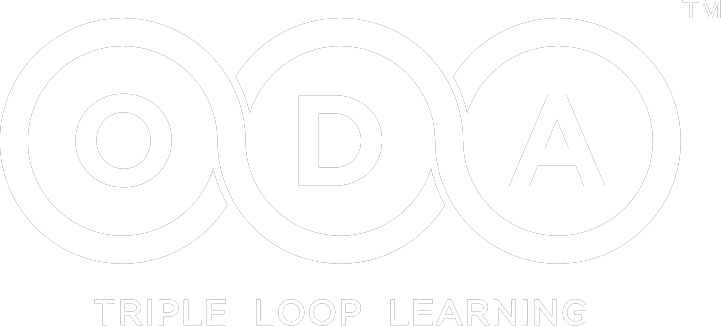From Diagnostic OD to Dialogic OD
As per the traditional view ‘an organisation becomes what it becomes because of the direction, programs, plan chosen by the dominant coalition in the organisation and implemented through the administrative system designed by them’. This construct could be limiting when the organisation is challenged to re-invent themselves or go through a transformational change with complexities outside and inside. In such instances usually its not the expertise of the dominant coalitions which will lead to emerging possibilities but the ingenuity of the front runners.
If this is the case how can a transformational change be supported/ accelerated? What could be role of a leadership in facilitating transformational change?
The effectiveness of any planned change management process is dependent on how well cause-effect relationships of the contributing variables are traceable. In conditions where the contributing variables keep shifting it’s tough to project plan change! This realisation that transformational change is more emergent than planned has been challenging change management agents and consultants to revisit the existing practices of change management.
In our times Whole system change is becoming complex than complicated. While in a complicated situation what causes what can be figured out, ahead of time, so collecting data and information about the issues and concerns could be the best way to resolve problems. In a complex situation predicting what will lead to what becomes tough. While we look at transformational change where an organisation is attempting to create a future which is not extension of their past, unlike incremental change its challenging to start knowing the means to the end. If we know the means to the end it may be just incremental in nature and may not be a transformational one.
What do we do together when we don’t know what we are doing yet?
Ron Heifitz the author of ‘The practice of adaptive leadership’ and Harvard professor differentiates between adaptive challenges and technical problems. We may be dealing with a technical problem ‘when we know steps to solve the problem, even though when those steps are intricate and complicated’. In such situations an expert or one person with the right vision can create a plan to solve it or train people to solve it. What about situations in which the expert or the leader does not know the steps to solve the problem. This typically happens when an organisation is striving to create an future which is not an extension of their past. In other words not incremental change but transformational change.
In times like this the primary role of leadership could be to enhance the adaptive capacity of the organisations before getting the strategy right
Latest findings in complexity science claims that often this seemingly “messy” processes of self-organisation among complex adaptive networks is what leads to unpredictable emergent change.
So, what can leaders do to improve the adaptive capacity of the organisation?
From Diagnostic OD to Dialogic OD
8 years ago when I started learning about Organisation Development the popular narrative was ‘OD is Diagnostic centric’. This was also because the foundational OD was grounded in the idea that, while supporting the planned change the role of change agent is to use data based action research methodologies to diagnose contributing factors to the real organisation problems. Subsequently, change was a result of a re-educative process of increasing awareness and engaging members in formulating changes based on that new awareness. In today’s world of rapid change diagnosis inherently provides an out of dated picture for the client system to work with.
Diagnosis at best can only capture a moment in time. By the time contracting is completed, a diagnostic process initiated, data collected, responses prepared for presentation, and a feedback session conducted conditions could have shifted in important ways. This has always been a limitation of the data-feedback model, but it has become an increasing concern with the shift to today’s world of hyper- active systems and continuous change
The influence of complexity sciences, sociology, and philosophy has given a new lens to OD called Dialogic OD coined by Bob Marshek and Gervase Bush. Dialogic OD may involve a number of practices that are usually known as large group interventions that said ever since Bob Marshak and Gervase Bushe coined the term it has helped create an operating system level shift among OD practitioners
While Diagnostic OD used to look at organisations as open systems, Dialogic OD is based on a view of organisation as a dialogic systems where individual, group and organisational actions result from socially constructed realities created and sustained by the prevailing narratives, stories, metaphors and conversations through which people make meaning of their experiences.

With this perspective change results from the following
- Changing conversations that shape everyday thinking and behaviour by involving more and different voices
- Altering how and which people engage with each other.
- Stimulating alternative or generative images to shape how people think about things
Thus instead of change driven by diagnosing how to objectively align or re-align organisational elements (strategies, structures, systems, people practices, etc.) with the demands of the broader environment as suggested by open systems theory, the dialogic systems perspective invites considering how to induce new ways of thinking by altering the ongoing organisational conversations that continuously create, re-create and frame understanding and action.
Dialogic OD in Action: The Process of a Dialogic OD intervention
As stated earlier, the operating principle of any Dialogic OD intervention is that change occurs when the day to day thinking of the team/ group members has altered the day to decisions and actions. The thinking is changed when the language, stories and narratives the community uses is altered in a profound way.
Given that the following could be Process for a Dialogic OD intervention
- What’s the ‘Big Story’? Identify the concerns driving the change effort and reframe it in a possibility-centric, future focused and compelling way. The reframing of the possibility should be such that people who’re involved should be willing to crawl over glass to engage in conversations around it, simply because it matters to them. While Dialogic OD is concerned about problems it does not deal with them through ‘problem-solving’. For example: instead of working on problem of losing existing customers by analysing what went wrong in the past and who is responsible it focuses on creating raving fans and enhancing customer retention
- Hold events which will act as containers for generative conversations. Often in complex change situation what’s required is new ideas and fresh perspectives that the members will embrace and act on. One can create conditions for such conversation using a large group process like Appreciative inquiry, Future Search or World Cafe. Key to the success of such conversation is using generative images to elicit new ideas. Generative images are ideas, metaphors, phrases, objects, pictures, manifestos, stories, or new words with two properties A. This has a capacity to challenge guiding assumptions B. Compelling images which can provoke new options or alternatives. Example: When an education content company looks at a generative image of ‘infotainment’ as a new focus area they challenge the assumptions that education has to be serious dull and boring. Since the generative image is new and fuzzy it lets people interpret in multiple ways which leads to new possibilities. It’s called generative image because it evokes different meanings. Often these discussions around how might the group act differently around a generative image will leave them encouraged to act on what they find most personally relevant and meaningful. Eventually, the energy for acting on a generative image comes from the the amount of inspiration people feel; the quality of relationships in the community and the clarity about what to do next. Hence these events should be structured to optimise those 3 outcomes. Events like this does not prescribe a story for the group instead it helps the group assess the consequences of their existing narrative.
- Track and amplify : The amount of transformation change depends on unsupervised, self directed individuals acting differently on their own. In order to enable this sponsors need to pay attention to what’s working and fan them. Sponsors should also be able to imagine resources/ support that are likely to be needed by those pursuing worthwhile change and be ready and able to supply those when the momentum and energy is high. There should be a mechanism for the leaders to know about the existing narrative, safe spaces to be created for people to come and share everything they think and feel about the situation.

In essence Dialogic OD is about changing narratives which underpins the social reality. The spirit of inquiry is what separates this from the rest of the change management processes. There were times before knowing this as a consultant I was tempted to develop a good enough story about a change scenario which appeals to people who are paying me. In such situations usually there are certain stories which are suppressed and marginalised due to my bias. So the new realisation is to create space for people to reflect on existing narratives, assess impact and consequences of these narratives and create a new compelling narratives.
While ODA is supporting a transformational project for organisation the operating principle has always been ‘To shift from just fixing a/few problem to cultivating a system capable of addressing its own challenges’. Whether its a Big4 consulting firm trying to address the issue of attrition or a Pharma company going through a complex merger and restructuring this approach was able to leave behind a more evolved system, with a greater sense of direction, hope, personal connection with the will and energy to work across previously unbridgeable boundaries.
References
- Gervase Bushe and Bob Marshek : revisioning organisation development
- Barret F J. Thomas G F : the central role of discourse in large scale change
- Bushe, G.R., & Marshak, R.J. (2014b). The dialogic mindset in organization development. Research in Organizational Change and Development
-
Mohan Khttps://www.odalternatives.com/author/mohanorglens-com/
Please click here to download the latest OD PUBLICATION.

